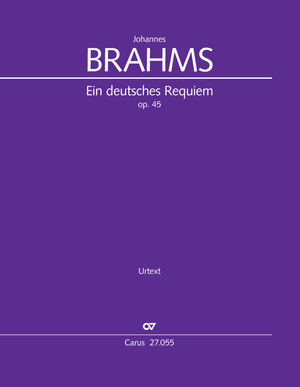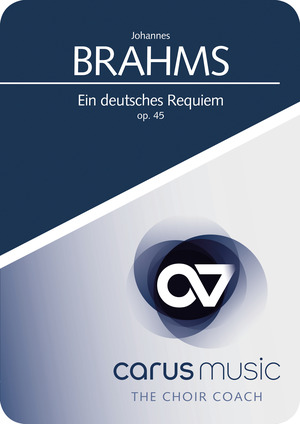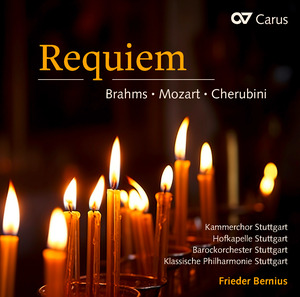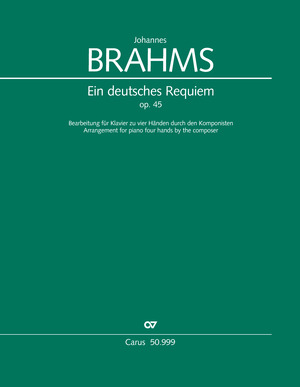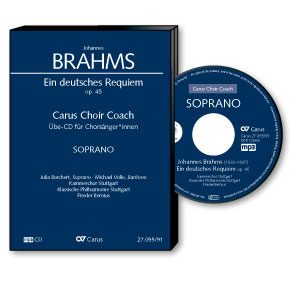
Le Requiem allemand de Brahms fait incontestablement partie des œuvres clés de l'histoire de l'oratorio. Représentant la communauté, le chœur intervient quasiment en permanence. Brahms associe de façon magistrale les techniques de composition historiques à des harmonies alors nouvelles, qui placent aujourd'hui encore les choristes face à des défis. Pour que l'œuvre ait la sonorité monumentale voulue et la profondeur d'expression souhaitée, les parties doivent être parfaitement sues – pas facile avec les nombreux changements de tonalité, les escapades vers des harmonies éloignées et quantité de pièges en ce qui concerne l'intonation.
Le Carus Choir Coach offre aux choristes une aide unique pour apprendre leur voix au sein de la sonorité du chœur et de l’orchestre. Pour chaque voix, un CD audio ou MP3 et un téléchargement est disponible avec tous les mouvements chantés par le chœur. Le CD se base sur un enregistrement d’interprètes prestigieux, qui ont pour celui-ci utilisé l’édition Urtext de Carus. Chaque mouvement est présenté en trois variantes :
- Version originale
- Coach : la voix sélectionnée est jouée au piano, avec l’enregistrement original en arrière-plan
- Coach en mode ralenti : l'enregistrement comme le coach sont ralentis à environ 70 % du tempo initial, ainsi les passages difficiles peuvent être travaillés efficacement.
Interprètes : Julia Borchert (Sopran), Michael Volle (Bass) – Kammerchor Stuttgart, Klassische Philharmonie Stuttgart – Frieder Bernius
Sommaire
-
Compositeur
Johannes Brahms
| 1833-1897Johannes Brahms' study of musical tradition was of crucial importance to his output: he combined church modes, canonic technique, Baroque style and diction, Bach's counterpoint and Beethoven's thematic-motivic work with the harmonic and expressive achievements of Romanticism to form his own distinctive style. In this respect his choral songs and vocal quartets (e.g. the “Liebeslieder Waltzes” and “New Liebeslieder Waltzes”), often to folk song texts, in which a musical microcosm unfolds, are examplary. His “Deutsches Requiem”, available from Carus in several different versions, constitutes one of the most fascinating confessions of faith in the history of music. Plus d'information sur la personne
-
Chœur
Kammerchor Stuttgart
The Kammerchor Stuttgart is regarded as one of the best ensembles of its kind. Over its fifty-year existence, Frieder Bernius has developed the choir into an exceptional ensemble acclaimed by audiences and press alike. This has led to invitations for the choir to perform at all the important European festivals. In Germany the chamber choir performs at festivals and in concert halls in repertoire ranging from the 17th to the 21st century. Frieder Bernius and his ensemble have received numerous accolades for their contribution to new music. The Kammerchor Stuttgart has made over 80 CDs and LPs, numerous of which have been awarded international recording prizes (including the Edison award, Diapason d’or, Gramophone Choice, Classical Internet Award, International Classical Music Award, and German Record Critics’ Award prizes). The International Federation for Choral Music has invited the ensemble to sing at the 1st, 4th and 10th World Symposia on Choral Music in Vienna, Sydney and Seoul. Regular tours of North America and Asia since 1988 and a South America tour reflect the Kammerchor Stuttgart’s international reputation. Since 1984 the top ensemble has also been invited to Israel biennially. Plus d'information sur la personne
-
Ensemble
Klassische Philharmonie Stuttgart
La Klassische Philharmonie Stuttgart se compose de musiciens d’orchestres symphoniques et d’ensembles chambristes allemands de première classe qui travaillent depuis longtemps avec Frieder Bernius. L’orchestre joue sur des instruments modernes mais chef d’orchestre et musiciens accordent une importance particulière à la différenciation stylistique. Dans la représentation d’œuvres symphoniques chorales à grande distribution, la Klassische Philharmonie Stuttgart est le pendant orchestral au Kammerchor Stuttgart. La Klassische Philharmonie Stuttgart a participé à différents festivals comme le Festival musical du Rheingau, le Festival musical européen de Stuttgart, le Festival international de Bade-Wurtemberg, le festival « Wratislavia Cantans » de Wroc³aw (Pologne), les Journées musicales de Kassel, la Société philharmonique de Bruxelles et les Herbstliche Musiktage de Bad Urach. L’idée de créer un partenaire instrumental de niveau équivalent au Kammerchor Stuttgart a été dernièrement consacrée par le Requiem allemand de Johannes Brahms enregistré ensemble. La revue française Répertoire a certifié à Frieder Bernius que sa vision de l’œuvre est une « pulvérisation discographique ». Plus d'information sur la personne
-
Chef d'orchestre
Frieder Bernius
| 1947Frieder Bernius’s work has earned great worldwide recognition. He is in demand internationally as a conductor and as a teacher. His principal artistic collaborators are the ensembles he founded himself, the Kammerchor Stuttgart, the Barockorchester Stuttgart, the Hofkapelle Stuttgart and the Klassische Philharmonie Stuttgart. As a guest conductor, he has collaborated repeatedly with, for example, the SWR Vokalensemble Stuttgart, the Deutsche Kammerphilharmonie Bremen, the Stuttgarter Kammerorchester and the Streicherakademie Bozen. Great stylistic versatility is Frieder Bernius’s hallmark. Whether he conducts vocal works by Monteverdi, Bach, Händel, Mozart, Beethoven, Fauré and Ligeti, stage music by Mendelssohn or symphonies by Haydn, Burgmüller and Schubert, his work always aims for a sound that is at once unmistakably personal and at the same time oriented towards the original period sound ideal. He devotes himself equally to the rediscovery of 18th century operas and to first performances of contemporary compositions. He is particularly interested in the musical history of southwestern Germany. Carus-Verlag has awarded Frieder Bernius a Golden CD for his complete recording of the sacred music of Felix Mendelssohn Bartholdy. The award was presented to him during the German Choir Festival in Stuttgart 2016. The sale of over 250,000 recordings, which has been acclaimed with a number of awards, has made a not insignificant contribution to what today is the obvious presence of Mendelssohn's complete œuvre in the concert repertoire. Plus d'information sur la personne
-
Solist - soprano
Julia Borchert
Julia Borchert ist seit 1997 als lyrischer Sopran am Niedersächsischen Staatstheater Hannover verpflichtet. Die in Bad Pyrmont geborene Sängerin begann an der Essener Folkwangschule ein Musiktheaterstudium, das sie bei Professor Ingeborg Most in Freiburg fortsetzte und 1991 im Rahmen der Künstlerischen Reifeprüfung mit Auszeichnung abschloß. Im selben Jahr trat sie ihr erstes Engagement am Nationaltheater Mannheim an und blieb dem Hause sechs Jahre lang verbunden. Als ständiger Gast singt die Künstlerin im Württembergischen Staatstheater Stuttgart seit 1995 die Gretel (Hänsel und Gretel). Weitere Gastspiele führten sie nach Karlsruhe, Bern, Düsseldorf, Köln und an die Bayerische Staatsoper München. Neben dem Opernfach gilt Julia Borcherts besondere Liebe dem Lied- und Konzertgesang. Plus d'information sur la personne
-
solist - baryton
Michael Volle
Questions fréquentes sur l'œuvre
 Il n'y a pas encore de questions et réponses concernant cette œuvre ou vous n'avez pas trouvé la réponse à votre question sur l'œuvre ? Cliquez ici et envoyez votre question spécifique à notre service clients.
Il n'y a pas encore de questions et réponses concernant cette œuvre ou vous n'avez pas trouvé la réponse à votre question sur l'œuvre ? Cliquez ici et envoyez votre question spécifique à notre service clients.


